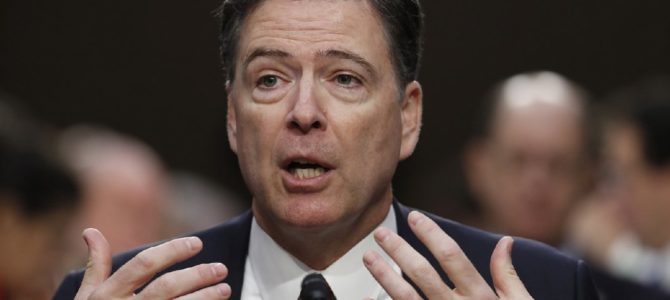A friend of former FBI director James Comey who leaked sensitive FBI memos to The New York Times in the wake of Comey’s firing in 2017 now claims to be Comey’s personal attorney. Daniel Richman, a law professor at Columbia University, told The Federalist via phone on Tuesday afternoon that he was now personally representing Comey.
The revelation comes in the wake of news that Comey was interviewed by the special counsel’s office last year. According to The New York Times, the line of questioning from the office of special counsel Robert Mueller focused on memos that Comey wrote and later leaked after he was fired from his job by President Donald Trump. A review of FBI policies governing the handling of sensitive government documents suggests Comey violated FBI policy by leaking the memos, which were produced on government time, using government equipment, and directly related to his official government responsibilities, according to Comey’s own testimony before Congress.
Sen. Chuck Grassley (R-Iowa), who serves as chairman of the Senate Judiciary Committee, wrote in a letter to the Department of Justice on January 3 that at least one of the memos Comey provided to his friend was classified.
“My staff has since reviewed these memoranda in a Sensitive Compartmented Information Facility (SCIF) at the FBI, and I reviewed them in a SCIF at the Office of Senate Security,” Grassley wrote. “The FBI insisted that these reviews take place in a SCIF because the majority of the memos are classified. Of the seven memos, four are marked classified at the ‘SECRET’ or ‘CONFIDENTIAL’ levels.”
“If it’s true that Professor Richman had four of the seven memos, then in light of the fact that four of the seven memos the Committee reviewed are classified, it would appear that at least one memo the former FBI director gave Professor Richman contained classified information,” Grassley noted in the letter.
Reached by phone on Tuesday, Richman refused to say when his legal representation of Comey began or whether he was personally representing Comey when the former FBI director testified before Congress in June 2017 about his deliberate leaking of the FBI records. The specific timing of the attorney-client relationship is important, because it may shield conversations between Comey and Richman regarding the coordinated leak of FBI records to the media from law enforcement scrutiny. Richman’s legal work on behalf of Comey was not known before today, as Comey testified before Congress in 2017 that Richman was merely a friend.
“I asked a friend of mine to share the content of the memo with a reporter,” Comey testified last June in response to a question from Sen. Susan Collins (R-Maine). “Didn’t do it myself, for a variety of reasons.”
“But I asked him to, because I thought that might prompt the appointment of a special counsel,” Comey continued. “And so I asked a close friend of mine to do it.”
“Who was that?” Collins asked.
“A good friend of mine who’s a professor at Columbia Law School,” Comey responded.
Despite being given multiple opportunities to do so, Comey never characterized Richman as his attorney, nor did he suggest that his directions to Richman to leak the memos to the media were privileged attorney-client communications. The news that Richman is now representing Comey raises questions about whether the special counsel may be investigating Comey and Richman for their roles in leaking classified information to the news media in order to get revenge on Trump for firing Comey.
The tactic of using attorney-client privilege to shield potentially illegal communications from law enforcement scrutiny is not a new one. During the FBI investigation of then-secretary of state Hillary Clinton’s potential mishandling of classified information, Cheryl Mills, one of Clinton’s top government aides at the State Department, also claimed that she could not testify about her communications with Clinton on the matter because she was also serving as Clinton’s personal attorney.
“I have nothing to say about any of this,” Richman responded, when asked directly whether attorney-client privilege was being asserted in order to shield his communications with Comey regarding the deliberate leaking of classified documents to the media.
Richman was first licensed to practice law in the state of New York in 1986, according to public records, and his current law license in that state is valid through October 2018.








